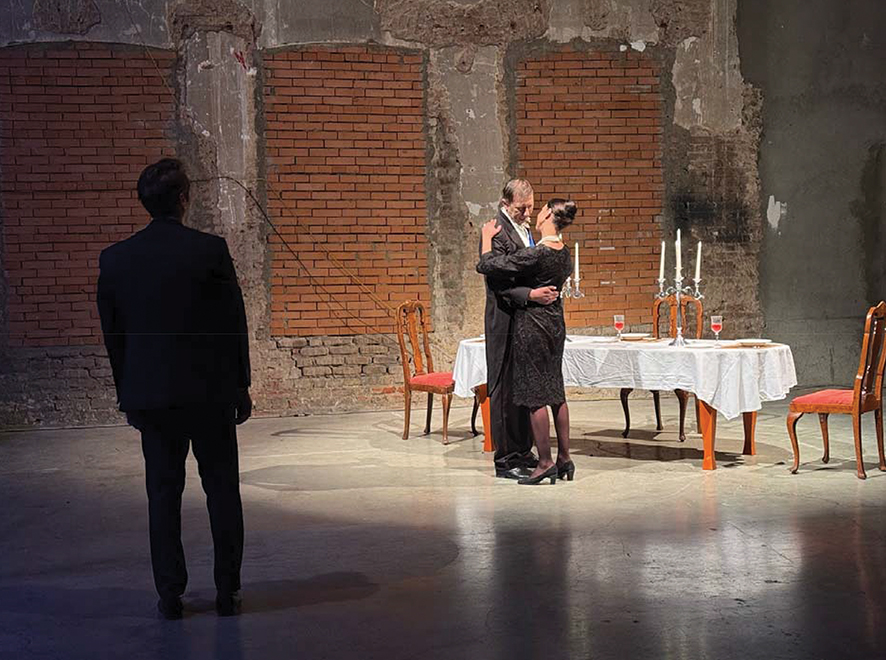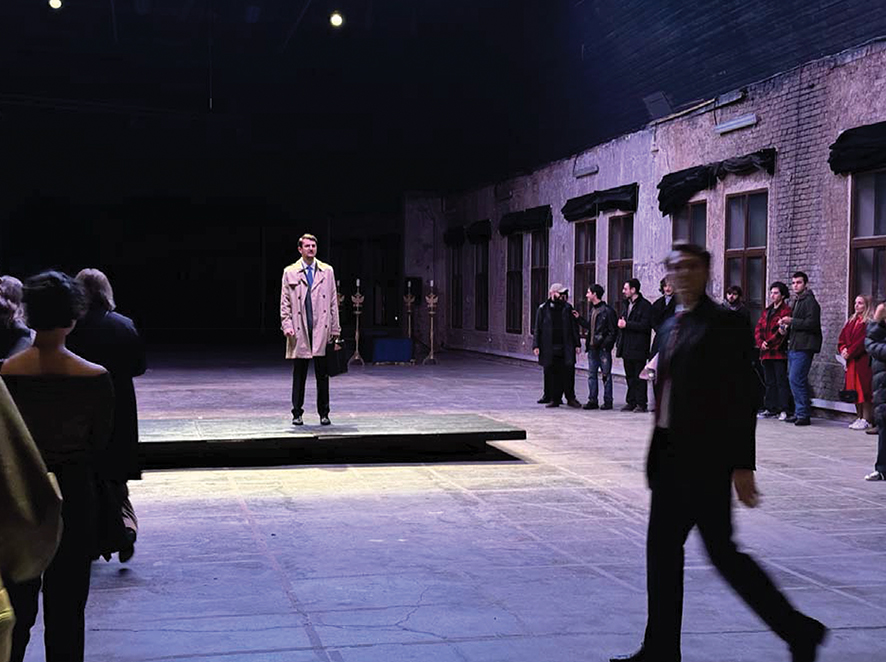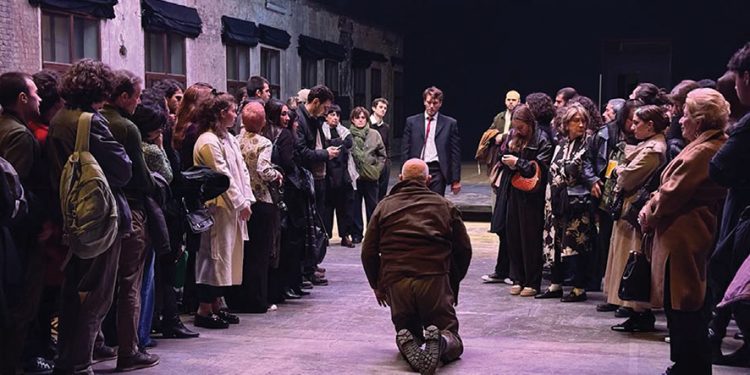In an era of political discontent, when voices demanding justice rise with intensity, Oedipus Rex, directed by Declan Donnellan, arrived in Tbilisi like an ominous mirror held up to power. Opening the GIFT 2024, the Georgian International Festival of Arts, on November 3rd and 4th at Silk Factory Studio, this production transformed Sophocles’ ancient tragedy into a striking allegory for contemporary context of corruption and accountability. While it doesn’t rely on trendy immersiveness or interactive effects, Donnellan’s production placed the audience in an ironic role, part of a “crowd scene” gathered by the government to witness a quest for justice that ultimately, and tragically, reveals its own corruption. Set against the backdrop of the recent parliamentary elections and ongoing protests in Tbilisi, Oedipus Rex couldn’t be more relevant.
As the GIFT Festival celebrates Georgia’s unique cultural identity, this staging of Oedipus underlines the festival’s international reach by evoking the universal relevance of themes like civic responsibility, integrity, and the high price of denial.
Yet for all its resonance, Donnellan’s production raises a provocative question: in an era of real, tangible calls for reform, can theater still break the fourth wall as effectively as the streets themselves?

The Audience as Witnesses: The “Crowd Scene” as Political Theater
Donnellan’s choice to make the audience a symbolic part of the crowd assembled by Oedipus is a clever, if understated, tool for modern resonance. In Oedipus Rex, the king gathers his people to publicly declare that no stone will be left unturned in rooting out the killer of Laius, the former king, whom the gods demand be cast out to end the city’s plague. Here, Donnellan’s Oedipus delivers these declarations with fervor, standing as a charismatic ruler so adamant in his pursuit of justice that he seems almost intoxicated by his own authority. Bruno Noferi’s Oedipus takes on an air of ecstasy as he promises to root out all corruption, leaving the audience, who know the myth’s trajectory, braced for the inevitable and tragic twist.
And yet, by merely casting the audience as witnesses rather than as active participants, Donnellan refrains from creating a truly immersive experience. The setting, with its minimalist design by Nick Ormerod, does not fully transform the audience into a dynamic, protesting mob or coerce them into complicity with the king. Instead, they watch, accomplices in truth, not in action, as Oedipus, in his tragic hubris, leads himself toward ruin. Ironically, it is the city’s real-life protests, the impassioned cries from Tbilisi’s streets, that break the fourth wall more viscerally than this performance ever could.

A Striking Allegory of Corruption and Decay
This Oedipus Rex confronts power’s ability to corrupt, to deceive itself, and ultimately to cannibalize its own legitimacy. As Oedipus takes on the role of his own prosecutor, he implicates himself with every declaration of righteous justice, unknowingly stripping himself bare. The ancient ritual of self-discovery becomes a very public denouncement, and as the truth unfolds, the king, once a towering figure of authority, becomes exposed as “naked;” guilty of the very crimes he sought to eradicate.
Donnellan’s Oedipus holds up a promise that resonates uncomfortably with audiences used to political rhetoric: a promise of transparency, a vow to be intolerant of corruption, a declaration of relentless justice. But as the tragedy reaches its inevitable climax, the audience’s role as detached witnesses forces them to confront a familiar truth: the grandiose speeches and moralistic declarations often mask deeper failings. Donnellan’s Oedipus doesn’t bring reform to Thebes; he brings revelation, a moment of terrible clarity where the public sees him for who he truly is. In doing so, Oedipus Rex transcends its origins to become a cautionary tale for a world grappling with the failures of authority.
Subtle but Powerful: The Production’s Minimalist Impact
Donnellan’s aesthetic is characterized by his restraint, and here, Oedipus Rex unfolds on a bare, almost bleak stage, where shadows and stark lighting create a sense of unease. Without the weight of elaborate sets, the audience is brought face-to-face with Sophocles’ text and the raw performances of Donnellan’s actors. In this space, every movement, every intonation, holds enormous weight. The set, designed by Ormerod, relies on a powerful simplicity, allowing Sophocles’ words, translated by Theodor and Constantin Georgescu, to resonate in their timeless tragedy.
While some may see Donnellan’s restrained, almost academic approach as lacking the visceral energy of modern immersive theater, it serves as an effective counterpoint to the performance’s potent themes. Rather than pulling the audience into an interactive spectacle, Donnellan’s staging leaves them to quietly observe a tragedy that they cannot stop. It’s a reminder that the power of classic theater lies in its ability to hold up a mirror to society; not necessarily to immerse us, but to illuminate the hard truths we may prefer to ignore.

Beyond the Stage: Theater as Political Resonance
This production of Oedipus Rex, supported by the Romanian State Culture Fund, features an outstanding international cast, including Ioana Andone as Jocasta and Petri Stefanescu as Creon. Each actor channels their character’s psychological complexity with Donnellan’s signature emphasis on physical expression. The cast’s restrained yet intense performances remind audiences that Oedipus Rex is more than a story of ancient Greek fate; it is a reflection on human fragility, denial, and the terrible cost of self-deception.
As Oedipus Rex plays out on stage, its themes reverberate far beyond the walls of Silk Factory Studio. The parallels between Oedipus’s reckless pursuit of justice and the political climate in Tbilisi are striking. As protests continue and the government faces mounting calls for transparency, this play, though restrained in its presentation, resonates with an ironic immediacy. Donnellan’s production may not literally break the fourth wall, but its narrative cuts through, reminding audiences that true accountability is often the first casualty in the rise and fall of power.
A Masterstroke of Timeliness
In the end, Declan Donnellan’s Oedipus Rex stands as a hauntingly relevant commentary on the perils of leadership and the cyclical nature of corruption. By relying on the power of minimalist staging and restrained audience involvement, Donnellan’s production speaks to the enduring potency of Sophocles’ tragedy in an era of tumultuous political landscapes.
As Tbilisi’s GIFT Festival continues, this opening production has made a strong case for the power of classic theater to engage with our most pressing contemporary dilemmas. And in a world where public trust teeters on the brink, Oedipus Rex resonates as both a reminder and a warning. Sometimes, theater’s greatest contribution is simply to show us, in stark, unvarnished clarity, that “the King is naked.”
By Ivan Nechaev














